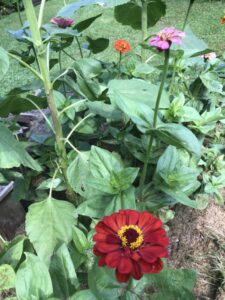A version of this column first ran in the Roane County (WV) Reporter and Times Record. Support local journalism! Subscribe to your local newspaper.
 Few if any gardeners are blessed with an unbroken stream of thriving, productive crops. Every year some things do especially well, better than I expected, and others flop. I’ve learned to accept the duds, and often learn something. Some of it is about patience and persistence.
Few if any gardeners are blessed with an unbroken stream of thriving, productive crops. Every year some things do especially well, better than I expected, and others flop. I’ve learned to accept the duds, and often learn something. Some of it is about patience and persistence.
Patience: when I saw a tree-cutting truck on my road, I pulled over and asked them whether they needed a place to dump their wood chips. They did, and a day or two later a truck came and dumped a huge pile of wood chips where I directed. I knew the pile would take five years to turn to compost but here’s what we learn as we age—the five years will go by, all by itself with no need to push the river of time, and five years later, voila—a nice pile of woody compost. In that case I relearned a lesson, though—the spot was beside my lane but also next to woods. The trees infiltrated their roots through the mass and made it very hard to collect any compost.
I should have remembered my experiment with leaf mold. I had a bin of chopped leaves in the sun and another in the woods; I wanted to see whether they would decompose as well in shade. But there too, the surrounding trees reached up and swiped my lovely leaf mold. I could still get some of it, but I had to rip through the fine roots to get it. Now I have two bins in the middle of the clearing where the thieving trees can’t reach.
By the way, if I haven’t mentioned it before, I have found that leaf mold is actually better for my garden than compost. I know this because I keep records, marking the edges of my beds in different colors whenever I add sand, compost, manure, leaf mold or peat moss. I collect leaves all down the lane I live at the end of, both to remove organic matter from the road and to use the leaves. I chop them, because they are then ready in one year instead of the two years whole leaves take to turn to crumbly dark leaf mold. Yes, I know I just claimed Zen-like patience, but the thing is, I always need that leaf mold—there is never enough compost.
Persistence—try again when something you want doesn’t come through. Your choice of crops should reflect many things, but number one is growing what you and your family like to eat. So if you try something you really want and get a crop failure, see if you can adjust your practices to solve the problem and try again. Look for online hints, ask a neighbor or friend who successfully grows whatever it is, or send me an email.
Here’s an example. I had a garden space at the north end of my clearing which had too many failures because it’s poorly drained—and then I used some hay infested with nutsedge, which likes wet ground, and it became a worse struggle to grow anything there. Finally I got the bright idea of making the space smaller, improving the fence, and turning it all into raised beds. It’s still wetter than my other garden space, but the raised beds help a lot. We turned the rest of the north end into un-mowed ground which we use for mulch hay.
Sometimes you can get around serious bug problems by planting later than usual. Many bugs have a schedule and come around sniffing for their favorite crops at the time they usually are ready (ready from the bug’s point of view, often much earlier than when the part you want is ready). If they don’t find them, they’ll move on and be elsewhere when you sneak the seeds into the ground a month late.
If the problem is a crop that needs a long growing season and still isn’t ready when the fall frost comes, you may be able to start them earlier indoors, and perhaps put some kind of protection up in the fall. I’ll have more to say about fall protection later in the year.
Use the comment section for questions, objections and suggestions.
